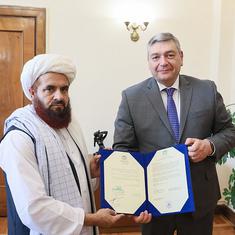‘Climate emergency’: UN panel report calls for immediate reduction in carbon emissions
Governments and corporations ‘are not just turning a blind eye, they are adding fuel to the flames’, United Nations chief Antonio Guterres said.

The United Nations Intergovernmental Panel on Climate Change on Monday said that an immediate reduction in emission of carbon dioxide was required to keep the global rise in temperature at 1.5 degrees Celsius, as decided in the landmark 2015 Paris Agreement.
“In 2010-2019 average annual global greenhouse gas emissions were at their highest levels in human history, but the rate of growth has slowed,” the report said. “Without immediate and deep emissions reductions across all sectors, limiting global warming to 1.5°C is beyond reach.”
The evidence is clear: the time for action is now. We can halve emissions by 2030.
— IPCC (@IPCC_CH) April 4, 2022
The #IPCC has just released its latest #ClimateReport on the mitigation of #climatechange.
Press Release ➡️ https://t.co/N9cLJFBbnA
Read the report ➡️ https://t.co/mIdBKgvokW pic.twitter.com/JbvFYy72qf
The report added that global emissions were required to be reduced by 43% from their existing levels by 2030 in order to reach the 1.5 degrees Celsius target.
The United Nations body made the observations in the third part of its sixth assessment report on climate change, drawing on the work of thousands of scientists. While the latest report focused on the mitigation of climate change, the previous two reports were centred on the underlying science and the impact of climate change.
IPCC Chair Hoesung Lee said the decisions were required to be made soon “in order to secure a liveable future”.
“We are at a crossroads,” Lee said in reaction to the report. “We have the tools and know-how required to limit warming. There are policies, regulations and market instruments that are proving effective. If these are scaled up and applied more widely and equitably, they can support deep emissions reductions and stimulate innovation.”
IPCC Co-Chair Priyadarshi Shukla said that having the right policies, infrastructure and technology to enable changes in our lifestyles can result in a 40-70% reduction in greenhouse gas emissions by 2050.
“This offers significant untapped potential,” Shukla said. “The evidence also shows that these lifestyle changes can improve our health and wellbeing.”
The latest report on climate change also drew sharp criticism from the United Nations chief Antonio Guterres, who blamed governments and businesses for “saying one thing, but doing another”.
“Simply put, they are lying,” Guterres said, according to the United Nations. “And the results will be catastrophic. This is a climate emergency.”
Guterres said that climate scientists have warned humankind of being perilously close to tipping points that could lead to cascading and irreversible climate impacts.
“But high-emitting governments and corporations are not just turning a blind eye, they are adding fuel to the flames,” he said.









